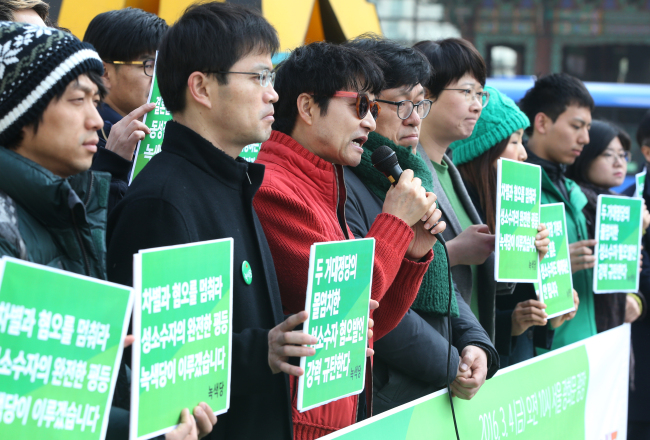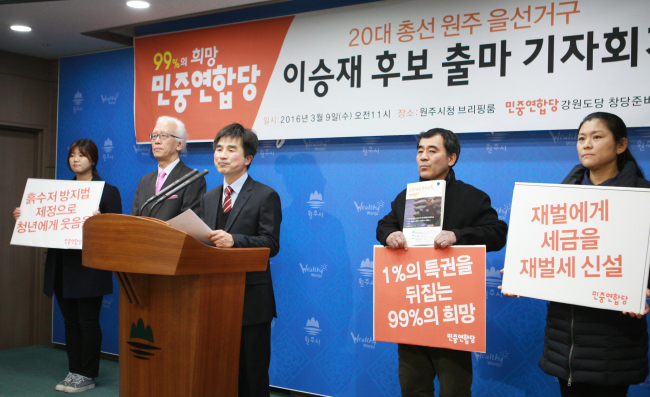South Korea will elect new National Assembly members in a general election on April 13. The Korea Herald is publishing a series of articles on the candidate agendas, election trends and notable runners leading up to the race. This is the sixth installment. –Ed
Park Jong-ung, a chief publicist for Korea’s Labor Party, stood with his coworkers at the front gate of the National Assembly on Tuesday to hold a press conference urging lawmakers to abandon the controversial counterterrorism bill.
“It is one of the agenda items that we are pushing forward,” Park told The Korea Herald, referring to the much-disputed legislation that cleared the Assembly earlier this month.” “Though we don’t have any elected lawmakers, we are trying to add different voices to the legislative process,” he added.
Korea’s Labor Party, which was established in 2013, is one of several minor political groups aiming to have their own candidates elected as representatives to National Assembly in the April general election.
As of Tuesday, the nation’s election watchdog has registered 23 groups as political parties and another 19 as preparation committees for creating new parties — meaning that 38 new political groups, beyond the four already holding seats, are seeking to make inroads in the 296-member Assembly.
The parliamentary seats are divided among the four major parties, with the ruling Saenuri Party and main opposition The Minjoo Party of Korea having 129 and 86, respectively. The Peoples’ Party and the Justice Party claim 19 and 1, respectively.
 |
| Caption: Prominent same-sex marriage activist Kim Jo Kwang-soo and fellow members of the Green Party Korea hold a press conference in downtown Seoul to protest against the court’s refusal to issue marriage licenses to same-sex couples. Yonhap |
As with the Labor Party, which plans to send 10 candidates out on the campaign trail, groups outside the legislative process seek to emerge as relevant political parties by gaining at least one parliamentary seat.
Green Party Korea, for instance, nominated five candidates for local constituencies and proportional representation, respectively. The 4-year-old party’s political platform is to advocate the right for minorities such as women, homosexuals and immigrants.
Jung Soo-yeon, 28, who announced her bid as a candidate for the Peoples’ Union Party said, “We will make sure that voices of the young people are heard in the Assembly.” Established in February, the progressive party vows to address youth unemployment and improve labor workers’ lives.
But the minor parties’ path to the Assembly appears to be a narrow one as they have never passed the electoral hurdle. To win parliamentary seats, the parties should either outperform mainstream parties in local elections or attract more than 3 percent of votes nationwide.
Since the former is unlikely due to the current single-constituency system, the minor parties have strived to pass the 3-percent threshold. The Green Party and Labor Party earned 1.25 and 0.84 percent, respectively, in the 2014 by-elections.
 |
| Peoples’ Union Party`s chairman Lee Seung-jae annonces his bid to the April general elections at the National Assembly. Yonhap |
Faced with such challenges, some minor political groups said that gaining seats in the upcoming election is not their priority. They instead focus on promoting their political agenda to the general public during the election season when attention to politics is relatively high.
Pyeji Party, a political group that roughly translates to a party to cancel government policies, did not bother to register itself as a political party. The group’s officials said that instead, it would use the election as an opportunity to urge the government to overhaul policies for the disabled.
Choi Yong-sang, who represents a political group that aims to provide assistance to Korean women forced into sexual slavery by the Japanese military, said, “Our party focuses more on helping the surviving family members than earning seats in the elections.”
There are also some minor groups that are capitalizing on the popularity of political heavyweights and former mainstream parties.
Four groups have named their parties after United Nations Secretary-General Ban Ki-moon. The names of former ruling parties such as Democratic Party and Grand National Party are also now being used by minor political groups.
By Yeo Jun-suk (jasonyeo@heraldcorp.com)

